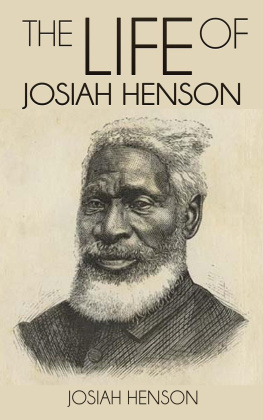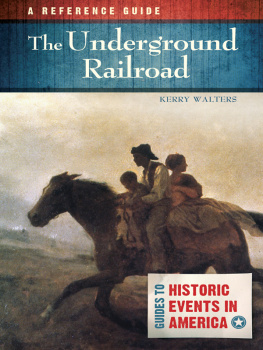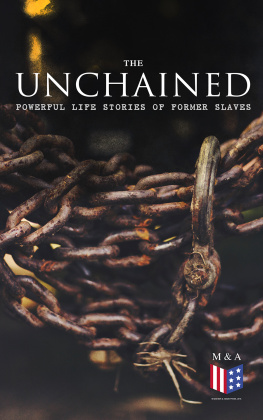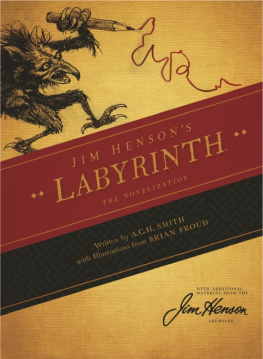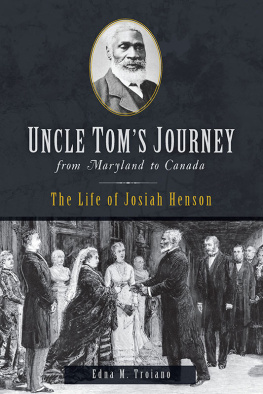The Life of Josiah Henson, Formerly a Slave, Now an Inhabitant of Canada, as Narrated by Himself
By Josiah Henson
The Life of Josiah Henson, Formerly a Slave, Now an Inhabitant of Canada, as Narrated by Himse lf by Josiah Henson. First published in 1849. This edition published 2017 by Enhanced Media. All rights reserved.
I SBN: 978-1-365-76964-1
I WAS born June 15, 1789, in Charles County, Maryland, on a farm belonging to Mr. Francis N., about a mile from Port Tobacco. My mother was the property of Dr. Josiah McP, but was hired by Mr. N, to whom my father belonged. The only incident I can remember, which occurred while my mother continued on N.'s farm, was the appearance of my father one day, with his head bloody and his back lacerated. He was in a state of great excitement, and though it was all a mystery to me at the age of three or four years, it was explained at a later period, and I understood that he had been suffering the cruel penalty of the Maryland law for beating a white man. His right ear had been cut off close to his head, and he had received a hundred lashes on his back. He had beaten the overseer for a brutal assault on my mother, and this was his punishment. Furious at such treatment, my father became a different man, and was so morose, disobedient, and intractable, that Mr. N. determined to sell him. He accordingly parted with him, not long after, to his son, who lived in Alabama; and neither my mother nor I, ever heard of him again. He was naturally, as I understood afterwards from my mother and other persons, a man of amiable temper, and of considerable energy of character; but it is not strange that he should be essentially changed by such cruelty and injustice under the sanction of law.
After the sale of my father by N., and his leaving Maryland for Alabama, Dr. McP would no longer hire out my mother to N. She returned, therefore, to the estate of the doctor, who was very much kinder to his slaves than the generality of planters, never suffering them to be struck by any one. He was, indeed, a man of good natural impulses, kind-hearted, liberal, and jovial. The latter quality was so much developed as to be his great failing; and though his convivial excesses were not thought of as a fault by the community in which he lived, and did not even prevent his having a high reputation for goodness of heart, and an almost saint-like benevolence, yet they were, nevertheless, his ruin. My mother, and her young family of three girls and three boys, of which I was the youngest, resided on this estate for two or three years, during which my only recollections are of being rather a pet of the doctor's, who thought I was a bright child, and of being much impressed with what I afterwards recognized as the deep piety and devotional feeling and habits of my mother. I do not know how, or where she acquired her knowledge of God, or her acquaintance with the Lord's prayer, which she so frequently repeated and taught me to repeat. I remember seeing her often on her knees, endeavoring to arrange her thoughts in prayers appropriate to her situation, but which amounted to little more than constant ejaculation, and the repetition of short phrases, which were within my infant comprehension, and have remained in my memory to this hour.
After this brief period of comparative comfort, however, the death of Dr. McP. brought about a revolution in, our condition, which, common as such things are in slave countries, can never be imagined by those not subject to them, nor recollected by those who have been, without emotions of grief and indignation deep and ineffaceable.
The doctor was riding from one of his scenes of riotous excess, when, falling from his horse, in crossing a little run, not a foot deep, he was unable to save himself from drowning. In consequence of his decease, it became necessary to sell the estate and the slaves, in order to divide the property among the heirs; and we were all put up at auction and sold to the highest bidder, and scattered over various parts of the country. My brothers and sisters were bid off one by one, while my mother, holding my hand, looked on in an agony of grief, the cause of which I but ill understood at first, but which dawned on my mind, with dreadful clearness, as the sale proceeded. My mother was then separated from me, and put up in her turn. She was bought by a man named Isaac R., residing in Montgomery county, and then I was offered to the assembled purchasers. My mother, half distracted with the parting forever from all her children, pushed through the crowd, while the bidding for me was going on, to the spot where R. was standing. She fell at his feet, and clung to his knees, entreating him in tones that a mother only could command, to buy her baby as well as herself, and spare to her one of her little ones at least. Will it, can it be believed that this man, thus appealed to, was capable not merely of turning a deaf ear to her supplication, but of disengaging himself from her with such violent blows and kicks, as to reduce her to the necessity of creeping out of his reach, and mingling the groan of bodily suffering with the sob of a breaking heart? Yet this was one of my earliest observations of men; an experience which has been common to me and the thousands of my race, the bitterness of which its frequency cannot diminish to any individual who suffers it, while it is dark enough to overshadow the whole after-life with something blacker than a funeral pall. I was bought by a stranger. Almost immediately, however, whether my childish strength, at five or six years of age, was overmastered by such scenes and experiences, or from some accidental cause, I fell sick, and seemed to my new master so little likely to recover, that he proposed to R., the purchaser of my mother, to take me too at such a trifling rate that it Gould not be refused. I was thus providentially restored to my mother; and under her care, destitute as she was of the proper means of nursing me, I recovered my health, and grew up to be an uncommonly vigorous and healthy boy and man.
The character of R., the master whom I faithfully served for many years, is by no means an uncommon one in any part of the world; but it is to be regretted that a domestic institution should anywhere put it in the power of such a one to tyrannize over his fellow beings, and inflict so much needless misery as is sure to be produced by such a man in such a position. Coarse and vulgar in his habits, unprincipled and cruel in his general deportment, and especially addicted to the vice of licentiousness, his slaves had little opportunity for relaxation from wearying labor, were supplied with the scantiest means of sustaining their toil by necessary food, and had no security for personal rights. The natural tendency of slavery is, to convert the master into a tyrant, and the slave into the cringing, treacherous, false, and thieving victim of tyranny.
R. and his slaves were no exception to the general rule, but might be cited as apt illustrations of the nature of the case.
My earliest employments were, to carry buckets of water to the men at work, to hold a horse-plough, used for weeding between the rows of com, and as I grew older and taller, to take care of master's saddle-horse. Then a hoe was put into my hands, and I was soon required, to do the day's work of a man; and it was not long before I could do it, at least as well as my associates in misery.
The every-day life of a slave on one of our southern plantations, however frequently it may have been described, is generally little known at the North ; and must be mentioned as a necessary illustration of the character and habits of the slave and the slave-holder, created and perpetuated by their relative position. The principal food of those upon my master's plantation consisted of cornmeal, and salt herrings; to which was added in summer a little buttermilk, and the few vegetables which each might raise for himself and his family, on the little piece of ground which was assigned to him

